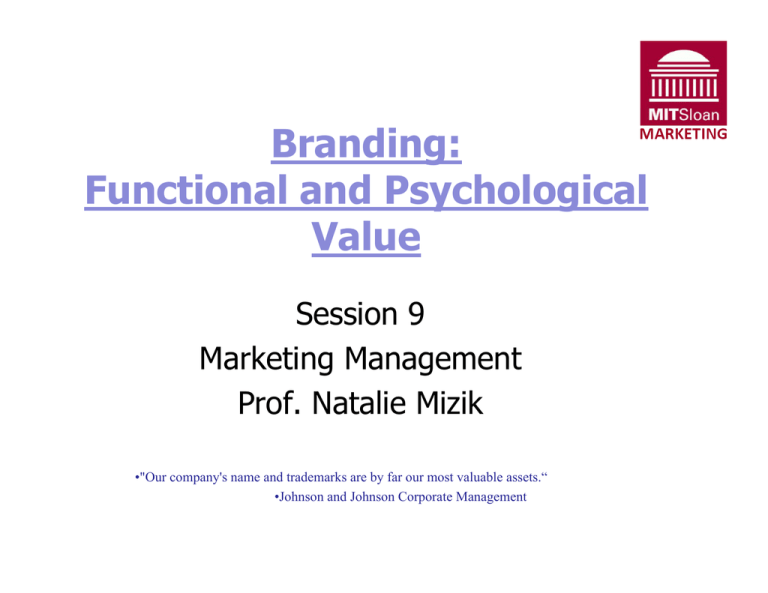
Branding: Functional and Psychological Value Session 9
Marketing Management
Prof. Natalie Mizik
•"Our company's name and trademarks are by far our most valuable assets.“
•Johnson and Johnson Corporate Management
Outline Psychological Value
Functional Value
The multi-attribute model
Conjoint Analysis
Economic Value
Functional Value
Psychological Value: Branding
What is a brand?
How do you extend a strong brand?
How do you place a value on a brand?
2
Prof. Natalie Mizik – 2010 MIT 15.810
Functional Value: Multi-Attribute Model your product
Preferencek = bik ei
perception that
your brand
possesses the attribute
importance
of each attribute
3
Prof. Natalie Mizik – 2010 MIT 15.810
Products have Psychological Value 4
Prof. Natalie Mizik – 2010 MIT 15.810
What is a Brand?
. . . A name, term, sign, symbol, or
design, or a combination of them
intended to identify the goods and
services of one seller or group of sellers
and to differentiate them from those of
competition.
. . . A promise that a firm makes to its
customers.
5
Prof. Natalie Mizik – 2010 MIT 15.810
Importance of Brands
“What’s in a name? That which we call a rose by
any other name would smell as sweet.”
- William Shakespeare
“Shakespeare was wrong. A rose by any other name
would not smell as sweet … which is why the single
most important decision in marketing of perfume is
the name.
- Al Ries and Jack T rout, Marketing Warfare
6
Prof. Natalie Mizik – 2010 MIT 15.810
Importance of Brands: Brands impact how we experience products © Prentice Hall. All rights reserved. This content is excluded from our Creative
Commons license. For more information, see http://ocw.mit.edu/fairuse .
Prof. Natalie Mizik – 2010 MIT 15.810
7
Power of Brands: Brand Equity = Financial Power
Consumer based
Loyalty, reduced price sensitivity
Product market based
Product differentiation
Price premium over unbranded alternatives
Barriers to competition
Ability to extend brand name to other categories
Leverage in distribution channels
Financial market based
Willingness of firms to pay for established brands
Cost of “creating” a new brand
Value from licensing
Half of market value of Fortune 250 is in intangible assets
8
Prof. Natalie Mizik – 2010 MIT 15.810
Brand Salience:
Brand Name, Awareness and Associations Awareness
Familiarity
Attitude
Inhibits recall of competing products
Stays in consumer memory for a long time
Names, symbols and slogans create
associations which aid memory
9
Prof. Natalie Mizik – 2010 MIT 15.810
Millions of Barrels
Managing Brand Equity: Schlitz Beer Sales 18
16
14
12
10
8
6
4
2
0
1972 1974 1976 1978 1980 1982 1984 1986 1988
Year
Source: David Aaker (1991), Managing Brand Equity
10
Prof. Natalie Mizik – 2010 MIT 15.810
Building Brand Equity . . . Response to a product due to brand
name over and above other aspects of the
product offering.
Having it is good (we know this), but how do
you build it (we don’t know this so well)?
Geo Prizm & Toyota Corolla are
“twin cars”
Both are manufactured in the same factory in Fremont California. The Toyota costs $400 more and sales are 5 times higher for the Corolla. Toyota earns 108M dollars more than GM. 11
Prof. Natalie Mizik – 2010 MIT 15.810
Core Brand Values Pyramid Consumerbrand
RESONANCE
COLD
Consumer
JUDGMENTS
Brand
PERFORMANCE
4.4.
RELATIONSHIPS
RELATIONSHIPS
== What
Whatabout
aboutyou
you&&
me?
me?
HOT
Consumer
FEELINGS
Brand
IMAGERY
Brand SALIENCE
by Kevin Keller
3.3. RESPONSE
RESPONSE
== What
Whatabout
about
you?
you?
2.2. MEANING
MEANING
==What
Whatare
are
you?
you?
1.1.
IDENTITY
IDENTITY ==
Who
Whoare
areyou?
you?
12
Prof. Natalie Mizik – 2010 MIT 15.810
EXAMPLE: (COLD path of pyramid)
Building utilitarian associations with a brand
Cadillac transforming image via performance
From Car and Driver Review:
“With a folding hardtop that completely disappears at the touch of a
button, the XLR presents a sleek and clean profile”
“Under the XLR’s hood lies its most significant major mechanical
distinction – the 4.6 liter Northstar V-8…upgraded in a variety of ways
for improved performance, emissions, and fuel economy”
New ad strategy is to move from heritage—classic
Caddies morphing into models—to performance
(engineering and speed)
Benefits to revitalizing the Cadillac brand
Average age of buyers has dropped
Resale values are rising
Prof. Natalie Mizik – 2010 MIT 15.810
13
EXAMPLE: (HOT path of pyramid) Building Imagery and Feelings to a Brand
MasterCard and the Priceless Campaign
Visa and American Express were targeting high end
Yet – there was an increase in purchasing power of “Middle
Class” Americans.
THEME: “Living the good life…was not the accumulation of
material things, but the sharing of meaningful moments
with loved ones and close friends.”
CATCH PHRASE: “There are some things money can’t buy.
For everything else there’s MasterCard.”
BENEFITS:
Global Reach: Variations in 96 countries / 45 languages
Accepted at more locations around the world than any
other card
# of Cards in US: MasterCard 319 Mil > Visa (270 Mil)
14
Prof. Natalie Mizik – 2010 MIT 15.810
Reminder: where we are COLD
Consumerbrand
RESONANCE
Consumer
JUDGMENTS
Brand
PERFORMANCE
4.4.
RELATIONSHIPS
RELATIONSHIPS
==
What
Whatabout
aboutyou
you&&
me?
HOT
Consumer
FEELINGS
Brand
IMAGERY
Brand SALIENCE
3.3. RESPONSE
RESPONSE
== What
Whatabout
about
you?
you?
2.2.
MEANING
MEANING ==
What
Whatare
are
you?
1.1.
IDENTITY
IDENTITY ==
Who
Whoare
areyou?
you?
15
Prof. Natalie Mizik – 2010 MIT 15.810
Resonance: Brand
Communities
3 core components of a community
Shared consciousness : members feel they sort of know each
other
“Who else drives Broncos: Guys like myself and guys who like
engines…”
Rituals and traditions: way in which meaning of community is
reproduced
“If you drove a Saab, whenever you passed someone else driving a
Saab on the road, you beeped or flashed your lights.”
Sense of moral responsibility: sense of duty to community as
a whole
“we see another Saab on the road, we pull over and help, no
matter what it is”
16
Prof. Natalie Mizik – 2010 MIT 15.810
Brand Extension
Brand Name
Product Category
Existing
Existing
New
New
Line
Extension
Brand
Extension
Multibrands
New
Brands
17
Prof. Natalie Mizik – 2010 MIT 15.810
Extending a brand name may . . .
Provide a point of differentiation
e.g., Weight Watchers
Aid in gaining awareness (less expensively)
e.g., Hershey pudding, Starbucks ice cream, instant
Aid in communication of complex idea
Induce trial/reduce risk
Increase favorability of evaluation
18
Prof. Natalie Mizik – 2010 MIT 15.810
House of Brands vs. Branded House: Example of “Umbrella” Branding
What company sells:
Airline travel
Credit cards
Cola
Vodka
Wedding coordination services
Movies (theatre)
19
Prof. Natalie Mizik – 2010 MIT 15.810
Brands are Important and Powerful, but
The trouble with Brand Equity is
that it has no consistent meaning….
No one knows how to measure it…
20
Prof. Natalie Mizik – 2010 MIT 15.810
Brand Valuation:
There are three main brand consultancies (among many) producing annual brand rankings:
Interbrand “Best Global Brands”
Published in Business Week in September
(since 2010 published in WSJ)
Millward Brown “Top 100 Lists”
Published in the Financial Times in April
Brand Finance “The World’s 500 Most Valuable Brands”
Published on their website in April
Interbrand and Millward Brown use the earnings split approach;
Brand Finance uses relief from royalty
21
Prof. Natalie Mizik – 2010 MIT 15.810
Highly Divergent Estimates of Brand Value Source: Type 2 Consulting
Prof. Natalie Mizik – 2010 MIT 15.810
© Type 2 Consulting. All rights reserved. This content is excluded from our Creative
Commons license. For more information, see http://ocw.mit.edu/fairuse.
22
No Agreement on the Direction of Change
Source: Type 2 Consulting
Prof. Natalie Mizik – 2010 MIT 15.810
© Type 2 Consulting. All rights reserved. This content is excluded from our Creative
Commons license. For more information, see http://ocw.mit.edu/fairuse.
23
Measuring Brand Value: Customer Based-Approaches
Indirect approaches
Brand awareness and
association measures
Direct approaches
“Brand blind” experiments
Willingness to pay
Conjoint analysis
Brand
IBM
Compaq
Apple
Dell
HP
U IBM BE IBM a1 speed a2 memory ...
Price Premium $
295
232
195
92
76
Source: McKinsey & Com
pany,
Comp
any, 1995
BEIBM U IBM U BaseBrand
U Base Brand a1 speed a2 memory ...
24
Prof. Natalie Mizik – 2010 MIT 15.810
Measuring Brand Value: Accounting and Financial Market-Based Approaches
“Goodwill” in balance sheet
Acquisition cost - Tangible assets
Cost of launching new, successful brand
Earnings split method
Stock Market Response to change in Brand
quality/ awareness/ perceptions/ etc.
measures
25
Prof. Natalie Mizik – 2010 MIT 15.810
Brand Value and Market Value Do brand perceptions affect capital market valuation?
Data: 2000-2006 (perceived brand Differentiation,
Relevance, Esteem, Knowledge, Energy)
Method: Regression-based model
Results: brand perceptions data significantly improves
enterprise valuation accuracy: % improvement in mean absolute
forecast error by sector
(1)
(2)
(3)
(4)
(5)
(6)
(7)
industrial
finance
retail, apparel
high-tech
nondurables
durables
travel, transport
17.4%
7.6%
2.4%
7.0%
9.3%
30.2%
15.7%
Mizik, Natalie and Robert Jacobson (2009), “Valuing Branded Businesses,” Journal of Marketing, 73 (6), 137-153
Mizik, Natalie and Robert Jacobson (2008), “The Financial Value Impact of Perceptual Brand Attributes,” Journal
of Marketing Research, 45 (1), 15-32
26
Prof. Natalie Mizik – 2010 MIT 15.810
Conclusion
Psychological Value
Functional value
multiattruibute model
conjoint analysis
Brand are valuable assets
Key elements of customer
state-of-mind brand value:
awareness
Economic Value
Functional Value
perceptions
associations
Measuring brand value is possible, though more refinements
are needed
Brands value needs to be managed and enhanced
27
Prof. Natalie Mizik – 2010 MIT 15.810
15.846: Branding 28
Prof. Natalie Mizik – 2010 MIT 15.810
MIT OpenCourseWare
http://ocw.mit.edu
15.810 Marketing Management
Fall 2010
For information about citing these materials or our Terms of Use, visit: http://ocw.mit.edu/terms.




